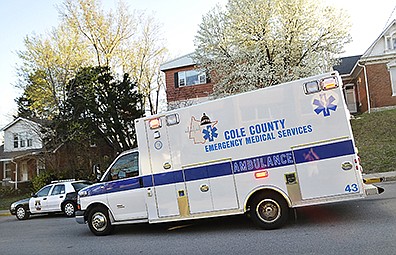The Cole County Commission will not implement a part-time pay scale for paramedics proposed as a way to reduce overtime expenses for the ambulance service.
"There had been some thought that maybe we should pay part-time medics, which are difficult to recruit, an amount above base pay as incentive to pick up shifts," Ambulance Director Jerry Johnston said. "The thought was that by offering that additional amount as enticement to pick up shifts, it would reduce overtime as full-time employees are forced to pick up remaining shifts not filled by full-time."
Johnston's proposal would have added another $3 to the part-time base pay. Part- and full-time paramedics start at $17.28 an hour. Part-time paramedics still would not have received benefits.
Right now, there are eight active part-time paramedics on staff.
Johnston told commissioners at their meeting Tuesday he had long believed the issue was not about money, but about time - since many of the part-time employees work multiple jobs.
"Nationally, there is a shortage of paramedics, and we're no different," Johnston said. "I really believe it isn't a pay issue, just a trend of few part-time paramedics wanting to get into the field on a full-time basis. It's like what we saw a decade or so ago when there was a nationwide shortage in nurses, and we hope the trend will change in the next few years."
It takes eight to nine months for an EMT to train to become a paramedic, Johnston said. They offer scholarships to staff members working to get that training, with two scholarships in the proposed 2018 budget. The ambulance service is requesting less in its 2018 overtime budget than for 2017.
The ambulance service is requesting $296,010 for its 2018 overtime budget. The County Commission initially budgeted $450,000 for overtime in 2017, but later amended that to $454,891.
Through the end of August, the service had used $258,930 for overtime and is projected to end the year at $386,906. The 2016 total for EMS overtime was $446,817.
Currently, the ambulance service has two shift types - 12-hour and 24-hour.
A 12-hour employee is scheduled three shifts one week and four the next, with eight hours of scheduled overtime per pay period. A 24-hour employee is scheduled for two 24-hour shifts per week, with 16 hours of scheduled overtime per pay period.
The 24-hour shift will be eliminated in January, leaving only 12-hour shifts.
Open shifts are filled primarily by part-time employees, helping minimize overtime. Full-time employees are used to fill shifts when part-time employees are not available.
Johnston said the service is in the process of hiring an additional 12 part-time employees in addition to the 25 already hired this year.

